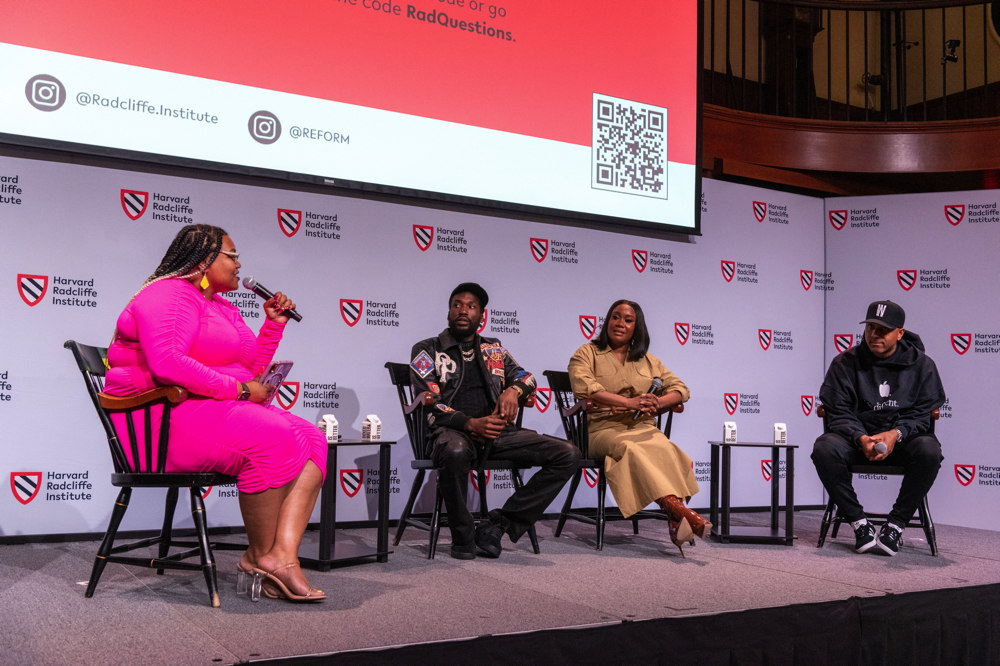Five years after his high-profile release from prison, Grammy-nominated rapper Meek Mill spoke at Harvard’s Radcliffe Institute about reforming the American parole system. Mill joined three other formerly incarcerated individuals who spoke to a crowd of Harvard students, community organizers, former prisoners, and young people involved with the Department of Youth Services. The panelists discussed their interactions with the justice system and argued in favor of parole reform.
In 2017, Mill was given a two-to-four-year sentence for violating parole, sparking the #FreeMeekMill movement to get the rapper out of jail and encourage justice system reform. Mill’s case highlighted the fact that minute technical violations can lead to lengthy prison sentences and attracted high-profile supporters such as Michael Rubin (then-owner of the Philadelphia 76ers) and Robert Kraft (owner of the New England Patriots).
After leaving prison, Mill continued to think about the wide reach of parole and probation in American society. In 2019, he launched REFORM Alliance, a nonprofit lobbying effort to loosen and simplify parole and probation laws nationwide, their mission statement: to “create real pathways to work and well-being.” According to REFORM’s CEO Robert Rooks, 40 percent of prisoners were formerly on probation or parole and 25 percent of prisoners are jailed for probation or parole violations. Outside of prisons, there are millions of individuals on probation or parole who are, in Rooks’s words, “free but not free.”
Tuesday’s panel was just one part of Harvard’s effort to advocate for prison reform. The event, according to Radcliffe Dean Tomiko Brown-Nagin, “reflects our commitment to support the rights of incarcerated and formerly incarcerated people, and to spotlight the devastating impact of mass incarceration in this country.” The event was organized by the Radcliffe Institute’s program on law, education, and justice, which allows students at Harvard and other local universities to engage directly with incarcerated individuals. Currently, students are participating in a music program at Suffolk County’s Nashua Street Jail.

Panelists from left to right: Brittany White, Meek Mill, Ayana Bean, and Wallo
Photograph courtesy of Radcliffe Institute
During the conversation, the panelists spoke about the challenges they faced during their sentencing and parole. Mill recounted how his public defender during his first arrest as a teenager did not help him understand the court proceedings. “I talked to my lawyer maybe two times,” he said. “He knows I’m uneducated, he knows I’m illiterate,” and his legal jargon seemed like a “secret language.” If the justice system is set up such that people do not understand their charges or the terms of their parole, Mill argued, it demands reform.
The challenges of incarceration follow prisoners even after their release. Ayana Bean, a Boston activist, shared how difficult it was for her to find a job while on parole because she kept failing background checks. The terms of many parole and probation agreements require holding down a job and sending monthly payments to a parole officer. Responding to this challenge, REFORM holds large-scale job fairs. “We know that jobs, housing, and supportive services are what people need when they leave,” said CEO Robert Rooks. Jobs are a route for formerly incarcerated people to “provide for their families and their community.”
While Mill recognized that many aspects of the justice system merit change, he felt that he could best help by focusing on parole and probation reform. The panelists noted the daunting reach of parole; Wallo, a Philadelphia-based influencer, shared that he will remain on parole until 2048. Mill and his team at REFORM want to advocate on behalf of large numbers of people who are deeply impacted by such policies, rather than seek to free individual prisoners. “I try to tap [into] places where I know that it’s super effective,” said Mill. “And probation was one of the ones where it affected my life.”
The panel’s moderator, Brittany White, who is a visiting practitioner at Harvard Radcliffe Institute and Harvard Law School, shared her hopes that ex-prisoners like her will guide national discussions about justice reform. “I’m making a case for formerly incarcerated people,” she said, “that our experience is in fact expertise.” In an interview after the event, she added, “It was very important for me to be able to showcase that I’m not an exception as a well-spoken, articulate, passionate, formerly incarcerated individual, but I’m actually the standard of what justice-impacted brilliance looks like.”









